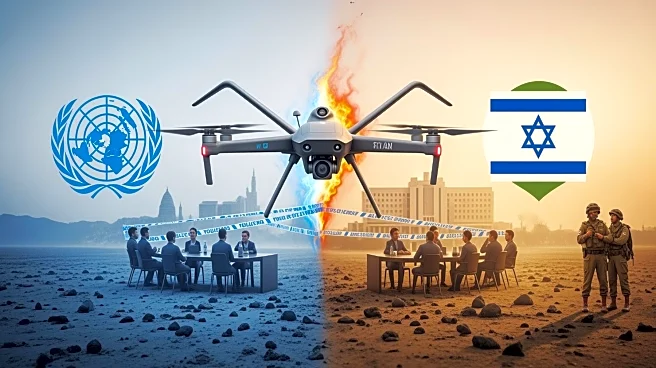What's Happening?
The United Nations peacekeeping mission in southern Lebanon, known as UNIFIL, and the Israeli army have reported conflicting accounts regarding the shooting down of an Israeli drone. The incident occurred
as Israeli military operations in Lebanon have intensified, following the recent escalation in hostilities between Israel and Hezbollah. According to the Israeli military, the drone was conducting routine reconnaissance near UNIFIL forces in Kfar Kila when it was shot down. The Israeli Defense Forces (IDF) stated that after the drone was downed, a hand grenade was thrown at the location. In contrast, UNIFIL claimed the drone flew aggressively over their patrol, prompting defensive measures to neutralize it. The peacekeepers reported that an Israeli drone subsequently dropped a grenade near their mission, and an Israeli tank fired in their direction, though no injuries were reported. This incident comes amid ongoing pressure on the Lebanese government to disarm Hezbollah, a powerful militant group based in southern Lebanon.
Why It's Important?
The incident underscores the fragile nature of the ceasefire between Israel and Hezbollah, which has been under strain since the recent escalation in violence. The conflicting accounts from UNIFIL and the Israeli army highlight the complexities and challenges faced by peacekeeping forces operating in volatile regions. The situation also reflects broader geopolitical tensions in the Middle East, where international actors, including the United States, are involved in diplomatic efforts to prevent further escalation. The potential for renewed conflict poses significant risks to regional stability and could have broader implications for international relations and security. The incident also raises questions about the effectiveness and future role of UN peacekeeping missions in conflict zones.
What's Next?
The United Nations Security Council has already decided to end UNIFIL's mandate by December 31, 2026, with a year allocated for the mission to wind down and withdraw. This decision may influence the dynamics on the ground, as stakeholders consider the implications of a reduced international presence. The Lebanese government faces increasing pressure to address the issue of Hezbollah's armament, which could lead to internal political challenges. Meanwhile, international diplomatic efforts are likely to continue, aiming to de-escalate tensions and prevent further military confrontations. The response from major stakeholders, including the United States and regional powers, will be crucial in shaping the future course of events.









